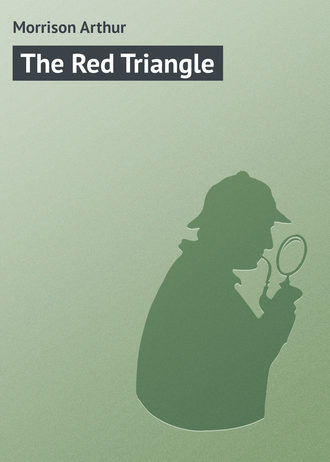 полная версия
полная версияThe Red Triangle
"As to Samuel's prevarications, there is only one explanation that will fit, now that the rest is made clear. He must have been entrusted with these diamonds by a private owner, for sale – secretly. Some lady of conspicuous position in difficulties, probably – perhaps unknown to her husband. Such things occur every day. A common expedient is to sell the stones and have good paste substituted, in the same settings. Samuel would be just the man to carry through a transaction of that sort. That would account for everything. The jewels are en suite, cut, but unset – taken from a set of jewellery, and paste substituted. Samuel arranges it all for the lady, finds a customer – Denson – who treats him exactly as he has told us. When he realises the loss Samuel doesn't know what to do. He mustn't call the police, being bound to secrecy on the lady's behalf. He sends her a hasty message, and remains keeping watch by Denson's office. She hurries to him with all possible secrecy, keeping her carriage blinds down; he dashes into the brougham to describe the disaster, taking his case with him in his frantic desire to explain things fully. The lady fears publicity, and won't hear of the police – she instructs him to consult me: and consequently, of course, when I recommend communicating with the police he won't listen to the suggestion. Samuel has arranged with the lady to hurry off and report progress as soon as he has consulted me, and this he does, the lady having appointed Manchester Square for the interview. Perhaps she hints some suspicion of Samuel's honesty – rather natural, perhaps, in the circumstances. That terrifies him more than ever, and leads to his frantic appeals to me when I throw the case up. Come, there's my guess at the facts of the case, and I'll back it with twopence and a bit more. Eh, Plummer?"
"I don't take your bet," answered Plummer. "The thing's plain enough; except the murder. There's something deeper there."
Hewitt became grave. "That's true," he said, "and something I can see no way into, as yet. But come – you take this parcel of diamonds, as representing the law. And here comes one of your men, I think."
We had been approaching the front door during this talk, and now a police constable appeared, and saluted Plummer. "Samuel's just been brought in, sir," he reported. "He's half dead with fright, and he's sent a message to Lady H – in P – Square; and he says he wants Mr. Martin Hewitt to come and speak for him."
"Poor Samuel!" Hewitt commented. "Come, we'll go and make him happy. Here are the diamonds, and, those safely accounted for, there's no evidence to connect him with the murder. We'll get him out of the mess as soon as possible."
And so they did. Hewitt's reading of the case was correct to a tittle, as it turned out, and with very little delay Samuel was released. But with the message from the police station, the fat was in the fire as regarded Lady H – . Her husband necessarily became acquainted with everything, and there was serious domestic trouble.
Samuel was glad enough to get quit of the business with no worse than a bad fright, as may well be supposed. He showed himself most grateful to Hewitt in after times, giving him excellent confidential advice and information more than once in matters connected with the diamond trade. He is still in business, I believe, in a much larger way, and I have no doubt he is the wiser for his experience, and for the lesson which Hewitt did not forget to rub well in: that it is useless and worse to place a confidential matter in the hands of a man of Hewitt's profession, and at the same time withhold particulars of the case, however unessential they may appear to be.
But meantime, on the way to Vine Street I asked Hewitt what led him to suppose that the new key on Denson's bunch fitted a lock in that particular office building.
"Call it a lucky guess, if you like," Hewitt answered; "but as a matter of fact it was prompted by pure common sense. Plummer showed me the things found on the body, and I saw at once that the keys offered the only chance of immediate information. I went through them one by one. There was his latchkey – the key with which he had gone into his lodgings to fetch away the disguise. There was another largish key, equally old – probably the key of his office door. There were other smaller keys, also old – plainly belonging to bags and trunks and drawers and so forth. And then there was the large, perfectly new key. What was that? It was not the key of any bag or drawer, clearly – it was the key of a door – a door with a lever lock. What door? Had Denson some other office? Perhaps he had, but first it was best to begin by trying it on places we were already acquainted with. At once I thought of Denson's disappearance unobserved by the housekeeper. Could this be the key of some private exit from the office building? I resolved to test that conjecture first, and it turned out to be the right one. Being successful so far, of course I turned to the other new key and tried that, as you saw."
"But what of that triangular mark on the man's forehead?"
Martin Hewitt became deeply thoughtful. "That," he said, "is a matter wholly beyond me at present, as indeed is the whole business of the murder. Whether we shall ever know more I can't guess, but the matter is deep – deep and difficult and dark. As to the mark itself, that seems to have been impressed from an engraved stamp of some sort. It is a plain equilateral triangle in red outline, measuring about an inch on each side. It is in a greasy, sticky sort of red ink, which may be smeared, but is very difficult, if not impossible, to rub away. What it means I can't at present conjecture. I have told you my reasons for not thinking it the sign of any gang of criminals. But whose sign is it? Surely not that of some self-constituted punisher of crime? For such a person, with no risk to himself, could have handed Denson over to the police, if he knew of his offence. Can he have been murdered by an accomplice? But he used no accomplice; if one thing is plain in all that story of the stolen diamonds it is that Denson did the thing wholly by himself. Besides, an accomplice would have taken the keys and have gone and secured the diamonds for himself; else why the murder at all? But no keys were taken – nothing was taken, as far as we can tell. And why was the body placed in that conspicuous position? It is pretty certain that the crime cannot have happened where the body was found – somebody must have heard or seen a struggle in such a place as that. As it is, I should say, the body was probably brought quietly to the spot in a cab, or some such conveyance.
"But mystery envelops this crime everywhere. So far as I can see, there is no clue whatever beyond the Red Triangle, which, as yet, I cannot understand. The strangling points to the murder being committed by a powerful man, certainly, and it is a form of crime that may have been perpetrated silently. But beyond that I can see nothing. The apparent motivelessness of the thing makes the mystery all the darker, and the circumstances we are acquainted with, instead of helping us, seem to complicate the puzzle.
"What was it that Denson feared when he left those diamonds behind him, when he might have carried them away? And why should he fear it in daytime and not at night, since it would seem plain that he meant to have returned for the stones at night? Where did he go to disguise himself yesterday – we know it was not in his lodgings – and where has he left the clothes he discarded?"
All these doubts and mysteries were destined to be cleared up, in more or less degree; but it was not till Hewitt and I had witnessed other singular adventures that the answer came to the problem, the real meaning of the Red Triangle was made apparent, and its connection with the theft of Samuel's diamonds grew clear. For indeed the connection proved in the end to be very intimate indeed. Once, a little later, we were allowed to see a shade farther into the mystery, as I shall tell in the proper place; but even then the real secret remained hidden from us till the appointed end.
So ended the case of Samuel's diamonds, so far as concerned Samuel himself and the owner; but the case of the Red Triangle had only begun.
THE CASE OF MR. JACOB MASON
I
The mystery of Denson's death remained a mystery, despite all the police could do. The coroner's jury returned a verdict of "Murder by some person or persons unknown" – which, indeed, was all that could be expected of them; for they had no more before them than the bare fact that the body, disguised in the clothes of a labourer, had been found on the steps near the Duke of York's column, just before midnight, by a police constable. But for the housekeeper's identification, even the name of the victim would have been unknown. The jury certainly wasted some time in idle speculation as to the strange triangular mark found on the forehead, without a speck of evidence to help them; but in the end they returned their verdict, and went home.
But the police knew a little more than the jury, though that little rather confused than helped them. They exercised their judgment at the inquest in withholding all evidence of the theft of diamonds on which the victim had been engaged, the curious particulars of which I have already related. In this they followed their usual course in cases where the evidence withheld could give the jury no help in arriving at their verdict, and at the same time might easily hamper further investigations if revealed. For the theft had been frustrated by Martin Hewitt's exertions, as we have seen, and in any case the thief was now dead and beyond the reach of human punishment. The one matter now remaining for the police was inquiry into the murder of this same thief, and the one object of their exertions the apprehension of the murderer or murderers.
The case, as I have already said, was in the hands of Inspector Plummer, an intelligent officer and an old friend of Hewitt's. A few days' work after the inquest yielded Plummer so little result that he called at Hewitt's office to talk matters over.
"I suppose," Plummer began, "it's no use asking if you've heard anything more of that matter of Denson's murder?"
Hewitt shook his head. "I haven't heard a word," he said. "If I had, it would have come on to you at once. But I hope you've had some luck yourself?"
"Not a scrap; time wasted; and the few off-chance clues I tried have led nowhere, so that I'm where I was at the start. The thing is quite the oddest in all my experience. See how we stand. Here's a man, Denson, who has just pulled off one of the cleverest jewel robberies ever attempted. He so arranges it that he walks safely off with fifteen thousand pounds' worth of diamonds, leaving the victim, Samuel, stuck patiently in an office for an hour or two before he even begins to suspect anything is wrong, and then unable to set the police after him, for the reasons you discovered. But this Denson doesn't carry the plunder off straightway, as he so easily might have done – he conceals it in the very house where the robbery was committed, taking with him a key by aid of which he may return and get it. Why? As you explained, it was probably because he feared somebody – feared being stopped and searched on the day of the robbery– not after, since it was plain he meant to return for his booty at night. Who could this have been, and why did Denson fear him? Mystery number one. Then this Denson is found dead that same night disguised in the clothes of a labourer, in a most conspicuous spot in London – the last place in the world one would expect a murderer to select for depositing his victim's body, for it is evidently not the place where the murder was committed. More, on the forehead there is this extraordinary impressed mark of a Red Triangle. Now, what can all that mean? Robbery, perhaps one thinks. But the body isn't robbed! There are three five-pound notes on it, besides a sovereign or two and some small change, a watch and chain, keys and all the rest of it. Then one guesses at the diamonds. Perhaps it was an accomplice in the robbery, who finds that Denson is about to bolt with the whole lot. But if there's one thing plain in this amazing business it is that Denson had no accomplice; he did the whole thing alone, as you discovered, and he needed no help. More than that, if this were the work of an accomplice why didn't he get the jewels? There were the keys to his hand and he left them! And would such a person actually go out of his way to put the body where it must be discovered at once, instead of concealing it till he could himself get away with the diamonds? Of course not. But there was no accomplice, and it's useless to labour that farther. All these arguments apply equally against the theory that it was the work of some criminal gang. They would have taken all they could get, notes, keys, diamonds and all, and they wouldn't have been so foolish as to exhibit the body with that extraordinary mark; criminal gangs are not such fools as to take unnecessary chances and gratuitously leave tracks behind them, as you know well enough. Well then, there we stand. So far, do you see any more in it than I do?"
Hewitt shook his head. "No," he said, "I can't say I do. All the considerations you have mentioned have already occurred to me. I talked them over, in fact, with my friend Brett. My connection with the case ceased, of course, with the discovery of the jewels, and about the murder I know no more than has been told me. I never saw the body, and so had no opportunity of picking up any overlooked clue; though doubtless you have seen to that. I know not a tittle more than you have just summarised, and on that alone the thing seems mystery pure and unadulterated."
"All there is beyond that was ascertained by the divisional surgeon on examination of the body. The man died from strangulation, as you know, and the natural presumption from that was that the murderer must have been a powerful man. But the surgeon is of the positive opinion – he is certain, in fact – that Denson was strangled with an instrument – a tourniquet."
"A tourniquet?"
"Yes, a surgeon's tourniquet, such as is used to compress a leg or arm and so stop a flow of blood. He considers the marks unmistakable. Now that might point to the murderer being a medical man."
"Conjecturally, yes; though, of course, it justifies nothing more than conjecture."
"Precisely. Well, that was something, but precious little. A tourniquet is a common thing enough – no more than a band with screw fittings, and there was nothing to show that the tourniquet used was any different from a thousand others; and I can see no particular reason why a doctor should commit a murder like this any more than any other man; in which the divisional surgeon agreed with me. And doctor or none, that Red Triangle was altogether unaccounted for. About that, too, by the way, the divisional surgeon told me a little, but a very useless little. The mark was not properly dried, owing to its slightly greasy nature, and although it was almost impossible to remove it wholly, it was possible to scrape off a little of the ink, or colour. Here is a little of it on a paper – quite dried now, of course."
Plummer carefully took from his pocket a small folded paper, unfolded it, and revealed a smaller paper within. On this were two little smears of a bright red colour. "There – that's the stuff," he said. "The surgeon examined it, and he reports it to be rather oddly constituted – so as to bear some affinity of meaning, possibly, to the triangle. For the stuff is a compound of three substances – animal, vegetable and mineral; there is a fine vegetable oil, he says, some waxy preparation, certainly of animal origin, and a mineral – cinnabar: vermilion, in fact. But though there may be some connection between the triangle and the substances representing the three natural kingdoms, it gives nothing practical – nothing to go on."
Martin Hewitt had been closely examining the marks on the paper, and now he answered, "I'm not so sure of that, though, Plummer. I think at least that it gives us another conjecture. I should guess that the man you want, as well as being acquainted with the use of the tourniquet, has at some time travelled in, or to, China."
"Why?"
"Unless I am wider of the mark than usual, this is the pigment used on Chinese seals. A Chinaman's seal acts for his signature on all sorts of documents; it is impressed or printed by hand pressure from a little engraved stone die, precisely as this triangle seems to have been, and the ink or colour is almost always red, compounded of vermilion, wax, and oil of sesamum."
Plummer sat up with a whistle. "Phew! Then it may have been done by a Chinaman!"
Hewitt shrugged his shoulders. "It's possible," he said; "of course, though, the sign, the triangle, is not a Chinese character. As a character, of course it is the Greek Delta. But it may be no character at all. In the signs of the ancient Cabala, the triangle, apex upward as it was in this case, was the symbol of fire; apex downward, it signified water."
Plummer patted the side of his head distractedly. "Heavens!" he said, "don't tell me I'm to search all China, and Greece, and – wherever the cabalistic pundits come from!"
"Well, no," Hewitt answered with a smile. "I think I should, at any rate, begin in this country. I rather think you might make a beginning at Denson. That is what I should do if the case were mine. See if anything can be ascertained of his previous life – probably under another name or names. He may have been in China. Yes, certainly, as we stand at present, I should begin at Denson."
"I think I will," the inspector replied, "though there's precious little to begin on there. I'd like to have you with me on this job, but, of course, that's impossible, since it's purely a police matter. But something, some information, may come your way, and in that case you'll let me know at once, of course."
"Of course I shall – it's a serious matter, as well as a strange one. I wish you all luck!"
Plummer departed to grapple with his difficulties, but in fact it was Hewitt who first heard fresh news of the Red Triangle, and that from a wholly unexpected quarter.
It was, indeed, only two days after Plummer's visit that Kerrett brought into Hewitt's private room the card of the Rev. James Potswood, with a request for a consultation. Mr. Potswood's name was known to Hewitt, as, indeed, it was to many people, as that of a most devoted clergyman, rector of a large parish in north-west London, who devoted not only all his time and personal strength to his work, but also spent every penny of his private income on his parish. It was not a small income that Mr. Potswood spent in this unselfish way, for he came of a wealthy family, and though a good part of his parish was inhabited by well-to-do people, there was quite enough poverty and distress in the poorer quarters to cause this excellent man often to regret that his resources were not even larger. He was a spare active grey-whiskered man of nearly sixty, with prominent and not very handsome features, though his face was full of frank and simple kindliness.
"My errand, Mr. Hewitt," he said, "is of a rather vague, not to say visionary, character, and I doubt if you can help me. But at any rate I will explain the trouble as well as I can. In the first place, am I right in supposing that you were in some way professionally engaged in connection with that extraordinary case of murder a week or so ago – the case in which a man named Denson was found dead on the steps by the Duke of York's column?"
"Yes – and no," Hewitt answered. "I was professionally engaged on a certain matter about which you will not wish me to particularise – since it is the business of a client – and in course of it I came upon the other affair."
"Then before I ask what you know of that mysterious event, Mr. Hewitt, I will tell you my story, so that you may judge whether you are able to reveal anything, or to do anything. Of course, what I say is in the strictest confidence."
"Of course."
"I have a parishioner, a Mr. Jacob Mason, of whom I have seen very little of late years – scarcely anything at all, in fact, till a few days ago. He is fairly well to do, I believe, living a somewhat retired life in a house not far from my rectory. For many years he has laboured at natural science – chemistry in particular – and he has a very excellently fitted laboratory attached to his house. He is a widower, with no children of his own, but his orphan niece, a Miss Creswick, lives under his guardianship. Mr. Mason was never a very regular church-goer, but years ago I saw much more of him than I have of late. I must be perfectly frank with you, Mr. Hewitt, if you are to help me, and therefore I must tell you that we disagreed on points of religion, in such a way that I found it difficult to maintain my former regard for Mr. Mason. He had a curiously fantastic mind, and he was constantly being led to tamper with things that I think are best left alone – what is called spiritualism, for instance, and that horrible form of modern superstition which we hear whispers of at times from the Continent – the alleged devil-propitiation or worship. It was not that he did anything I thought morally wrong, you understand – except that he dabbled. And he was always running after some new thing – animal magnetism, or telepathy, or crystal-gazing, or theosophy, or some one of the score of such things that have an attraction for a mind of that sort. And it was a characteristic of each new enthusiasm with him that it prompted him to try to convert me; and that in such terms – terms often applied to the doctrines of that religion of which I am a humble minister – as I could in nowise permit in my presence. So that our friendly intercourse, though not interrupted by any definite breaking off, fell away to almost nothing. For which reason I was a little surprised to receive a visit from Mr. Mason on the afternoon of the day on which the newspapers printed the report of the finding of the body of Denson. You may remember that only one morning paper mentioned the matter, and that very briefly; but there were full reports in all the evening papers."
"Yes, the discovery was made very late the previous night."
"So I gathered. Well, I was told that Mr. Mason had been shown into my study, and there I found him. He was in an extremely nervous and agitated state, and he had an evening paper in his hand. With scarcely a preliminary word he burst out, 'Have you seen this in the paper? This – this murder? There – there's the report.' And he thrust the paper into my hands.
"I had not seen or heard anything of the matter, in fact, till that moment, and now he gave me little leisure to read the report. He walked up and down the room, nervously clasping his hands, sometimes together, sometimes at his sides, sometimes before him, shaking his head in a shuddering sort of way, and bursting out once or twice as though the words were uncontrollable, 'What ought I to do? What can I do?'
"I looked up from the paper, and he went on, 'Have you read it? It's a murder – a horrid murder. The poor wretched fellow was trying to escape, but he couldn't. It's a murder!'
"'It certainly seems so,' I said. 'But what – did you know this man, Denson?'
"'No, of course not,' Mason replied, 'but there it is, plain enough, and here's another paper with just the same report, but a little shorter.' He pulled the second paper from his pocket. 'I got what different papers I could, but these are the two fullest. It's plain enough it's a brutal murder, isn't it? And the man was a merchant, or an agent, or something, in Portsmouth Street, but he was found in labourer's clothes – proof that he feared it and was trying to escape it; but he couldn't – he couldn't – no! nor anybody. It's awful, awful!'
"'But I don't understand,' I said. 'Won't you sit down?' For Mason continued to pace distractedly about the room. 'What is it you think this unfortunate man was trying to escape? And what am I to do in the matter?'
"He stopped, pressed both hands to his head, and seemed to control himself by a great effort. 'You must excuse me,' he said. 'I'm a bit run down lately, and my nerves are all wrong. I'm talking rather wildly, I'm afraid. I really hardly know why I came to you, except that I haven't a soul I can talk to about – well, about anything, scarcely.'






